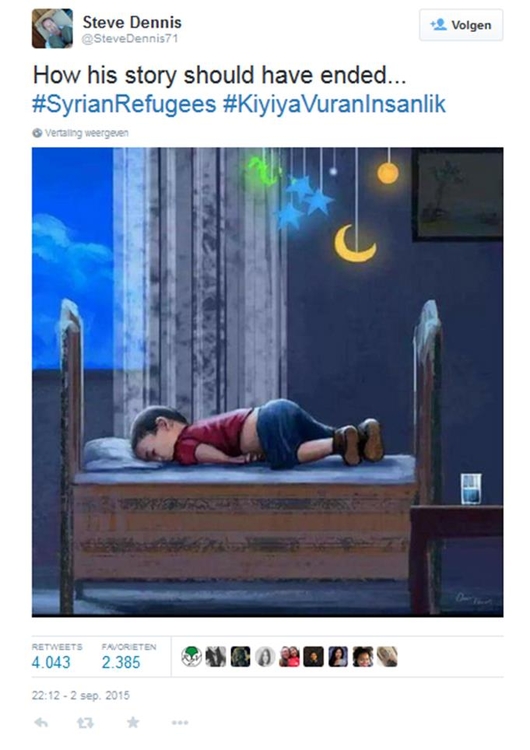Just like so many others, I too saw the page-filling image in last week’s papers of the three-year-old boy Aylan, washed up the shore nearby Bodrum, Turkey. He drowned when he and his family tried to escape the war in Syria. The images of the boy lying face-down on the beach and being carried away by a Turkish police officer shocked people all across the world, including myself and probably you, and became a symbol for the entire refugee crisis Europe is facing. No wonder the photos formed an inspiration for many cartoonists, an example of which is shown above this column. As Justin Forsyth, CEO of Save the Children, said:
“This tragic image of a little boy who’s lost his life fleeing Syria is shocking and is a reminder of the dangers children and families are taking in search of a better life. This child’s plight should concentrate minds and force the EU to come together and agree to a plan to tackle the refugee crisis.”
For me however, this raised the question: Why was the world not in such a state of shock before this image came out? Isn’t the refugee crisis already going on for months, or actually years even? Haven’t we seen the numbers of refugees that drown or lose their lives otherwise each month? Aren’t we a little late with statements like the one by mister Forsyth?
As I was thinking about this, I realized that when I saw this image, it was the first time that the refugee crisis came so close. You can easily imagine this child to live in your neighborhood, running around on the playground with his ball. To be the son of that couple you always run into at the supermarket. Maybe even to be a friend of your own little child.
And it is at the exact moment a thought like that comes to your mind, that you start realizing that this is not a risk that the family of this little boy should have been forced to take. That you start feeling responsible for his tragedy.
This is an example of how distance, whether it be a mental or physical distance, influences our feeling of responsibility. The same case can be made for the Trolley Problem, a famous thought experiment in ethics. For those of you who don’t know it: There is a runaway trolley barreling down the railway track, about to override five people that are tied down to the track ahead of the trolley. You are standing next to a lever with which you can lead the trolley to a different track, where only one person is tied down. Most people agree that it is justified or even your moral obligation to pull the lever and save four lives, by killing just one person instead of five.
But what if you are twenty miles away from the lever, seeing it happen on a television screen? Or on the other side of the continent, reading about the situation in a newspaper? That’s ringing a bell, right? Although in these situations it is way easier to just close your eyes, pretend you don’t know about it, think you are not responsible for the problem, in fact it makes no difference. You should still try to run those twenty miles to the lever, or call someone to pull the lever for you, or go on the streets and demand action from the government regarding the refugee crisis. We should all take our responsibility here, individually as well as a collective, and then we might be able to work out a solution for the dilemmas we are facing.
A solution that will be too late for Aylan, but maybe in time for all those children that we don’t see pictures from, but should feel an equal responsibility for.
